
|
|
About Continuum Advertising Advisory Committee Archives Contact Us Continuum Home Faculty/Staff Subscribe related websites Alumni Association Marketing & Communications University of Utah Home |

BookshelfJoyce is for Quitters
|
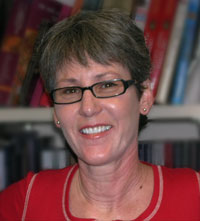 |
| Pamela “P.J.” Balluck, a U of U doctoral candidate in fiction, is co-editor of fiction for QW. |
Pamela Balluck—Not quite caught up in Catch-22
Catch-22 has been a cultural catchphrase since Joseph Heller’s completed novel was officially released, during my infancy, to a reading public referred to as “post-war” (the First and Second World’s, the Korean), though America was already in Vietnam. Nearly a decade later, in my adolescence (with the U.S. still in Vietnam), the film adaptation starring Alan Arkin (who won an Oscar this year for Little Miss Sunshine) wasn’t exactly a hit, next to Patton and M*A*S*H , but Heller’s WWII bombardier and Catch-22 regained momentum, and they continue to influence us in the 21st century. Catch-22 is here to stay as part of our lexicon, our vernacular—what to call a dilemma in which the solution to one problem senselessly causes or insolubly frustrates the solution to another, and you can’t win for losing.
I was an English graduate student in my early 40s negotiating the composition of my reading list for doctoral exams when I had to come to terms with the fact that I’d been using this expression most of my life (was even crazy about a guy with a dog named Yossarian in the ’80s) yet had never read the book. I bought a new paperback of Heller’s novel, but it somehow got elbowed off my exams list and onto the stack of unreads teetering at my bedside. When I finally plucked it out for pleasure, I pushed my way through only nine of its 42 chapters, stopping on page 113. This I admit with shame, because I used to pride myself on the fact that I wouldn’t put a novel down for good until the end.
But Catch-22 is a very black comedy about war, and I just didn’t have the patience or sense of humor for the insane reasoning Yossarian is subjected to. I owe Catch-22 a full reading. For now, I’m not up to it. It’s not that I’ve dumped the book, per se. I’ve called a time-out. (It’s not you, Catch-22, you classic number-one bestseller, it’s me!) I hope—sooner than later—to find my way back to Heller’s novel, and when I do, to start over, if not fresh, on page one.
 |
| Halina Duraj, a U of U doctoral candidate in fiction, is co-editor of fiction for QW. |
Halina Duraj—The Wrath of Steinbeck
I’ve picked up Steinbeck’s The Grapes of Wrath at least three times. I’ve taken it on a long flight to France. I’ve taken it camping. I’ve hunkered down on the couch with it. Each time I picked it up, I had to start over; enough time passed between attempts that starting where I left off felt like cheating. Each time, I get to the place where the turtle survives a near-collision with a truck, rights itself and moves on. Then I start watching the in-flight movie, or I get a glass of iced tea and open the mail, and it’s all over. That arduous, vicarious journey across the first pages exhausts me. But instead of righting myself and inching onward like Steinbeck’s turtle, I continue to flail.
The difficulty isn’t Steinbeck’s prose, which I love, nor is it the length (East of Eden is also long, but I read it in three days). What overwhelms me is the list of reasons why I should read The Grapes of Wrath: because it’s a Great American Novel, because it’s an important novel, because everyone I know read it in high school, because I’m a Californian and should know my state’s Depression-era history. Because I should finish what I’ve started. The more “shoulds” hurtle toward me with Mack-truck force, the more I retreat into my shell and turn toward something less serious—like a recent issue of In Style. I am a person who responds poorly to “shoulds.” I have many should-reads on my bookshelves, and they don’t get read.
If I go for a fourth try on The Grapes of Wrath, I don’t know what will make it a success. Perhaps total sensory deprivation? A long train trip? A desert island? Maybe a train trip around the perimeter of a desert island. Or maybe, more simply, by shrugging off at least one of the “shoulds” and letting myself start where I left off.
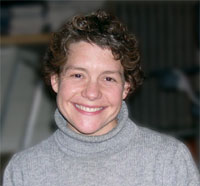 |
| Susan Goslee PhD’07 (Poetry) is co-editor of poetry for QW. |
Susan Goslee—Surviving The Worst Case Scenario…
I need a survival guide to escape from The Worst Case Scenario Survival Handbook, an innocuous little book I started reading, put down quickly, and have been intermittently re-living ever since. Instead of making me feel prepared for obstructed airways or grizzly bears, the book has me convinced that every trip is only moments away from complete disaster. A large, safe bridge on the interstate—an opportunity for my car to veer off the side into the rapids below. A fantastic taco stand—an excellent place for someone to choke to death on a jalapeño.
If you have an overactive and slightly macabre imagination, if you break out in a cold sweat even watching the Red Cross CPR and First Aid videos, stay away from this bitter yellow pill. The excruciating deaths this volume has helped me imagine in all-too-accurate detail are not the worst part, though. It’s the embarrassment. (In my version of Hell, being dead would not keep you from being embarrassed, which is worse than being dead.)
For after reading this book, I should have known better. If I had only reviewed, I would have remembered if pretending to be an untended patch of crabgrass is what fools killer bees or runaway trains. I would know how to perform the emergency tracheotomy on the alligator to remove my friend’s Mini Cooper from said reptile’s belly and then correctly place the car windows at half-mast so friend could escape from car, now quickly submerging in lake water and reptile intestines. But, just as in sixth grade, I didn’t even finish the reading assignment. I daydreamed instead, which was why I neither brought my walking stick, nor noticed the quicksand until it was much too late.
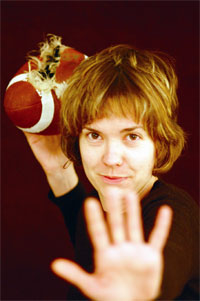 |
| Nicole Sheets, a U of U doctoral candidate in nonfiction, is QW nonfiction editor.. |
Nicole Sheets—Joyce is for Quitters
In The Polysyllabic Spree, Nick Hornby faces head-on a reader’s quandary: infinite books, finite time. Each month, Hornby lists his “Books Bought” beside his “Books Read” and explains the gaps (books acquired but not bought; books bought to have but not to read; start of soccer season, books abandoned).
I have stacks of books I’ve ignored for years. I keep buying more, thinking “professional development” and “If writers don’t buy books, who will?!”
And though my folks didn’t raise me to be a quitter, I’ve left books unfinished.
Example: A few years ago I joined a reading group for James Joyce’s Ulysses, his 1922 classic about a day in the life of Leopold Bloom. In the group were three professors from an English department, including one who’d published articles about Ulysses; a good-looking Fulbright scholar from Finland who was reading the book for the first time in English; and I, well, I had read a few stories from Joyce’s Dubliners and liked them. I made a plate of brownies and hoped I would be received.
Joyce’s prose knocked the wind out of me from the start: Stately, plump Buck Mulligan came from the stairhead bearing a bowl of lather… Oof. I loved it.
For the first few chapters, our group kept in step, but as spring heated up, everyone begged more time.
Meanwhile, I was packing for the Peace Corps. Every ounce mattered. I stood by my suitcases weighing a hardback Norton anthology in my left hand, a jar of Jif in my right. Ulysses was out of the question. I was two chapters away from the end.
By the time I found a crisp copy of Ulysses in the Peace Corps library, it was too late. I had already lost my momentum, and my support group. To read it, I’d have had to start all over (Stately, plump…). I sighed. I turned Ulysses into a bookend.
Will I finish it? Someday. Yes.
—Marcia C. Dibble is assistant editor of Continuum
Recent Publications from the U of U Press
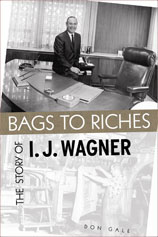
Bags to Riches: The Story of I. J. Wagner, by G. Donald “Don” Gale BA’58 MA’60 PhD’86, recounts the life of Salt Lake City native I. J. “Izzi” Wagner ex’32, who, although born into poverty, managed to amass a fortune through hard work, wise decision making, and a good dose of luck. (The “bags” in the title refers to Wagner’s taking over and making a success of the family business, Wagner Bag Company, after his father’s death, dropping out of the University of Utah—where he had just matriculated—to do so.) Wagner became a devoted community activist, funding the Rose Wagner Center for Performing Arts and the I.J. and Jeanné Wagner Jewish Community Center, and using his substantial influence to promote tolerance.
Biographer and Salt Lake City native Don Gale, president of Words, Words, Words Inc., a communication consulting company, has written for every format, from books to broadcast. During his longtime association with the University of Utah, Gale has served in various administrative positions and as a full-time faculty member, president of the Alumni Association, and chair of the National Advisory Council and the College of Fine Arts Advisory Board. He was named a Distinguished Alumnus by the Alumni Association in 1999, and has also received other honors from the Department of Communication.
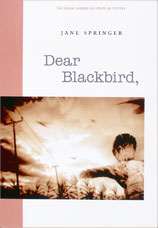
The press also recently released the poetry collection Dear Blackbird, by Jane Springer, 2006 winner of the University’s Agha Shahid Ali Prize.
Dear Blackbird, was selected by this year’s judge, noted poet and librettist J. D. McClatchy, who says of the collection, “Most new poetry I read nowadays seems decorous in its austerities or its embellishments: willed, over-plotted, dry. Not Jane Springer’s. Her work leaps to its tasks with a heady extravagance… This book is the most exciting debut in years, and when we remember that ‘début’ originally meant to score first in a new game, that is just what Springer has done: taken on a new set of terms and struck first, struck gold.”
The Agha Shahid Ali Prize in Poetry was inaugurated in 2003 to honor the late poet, a nationally recognized writer and a former professor at the University of Utah. (Continuum profiled Ali and discussed the eponymous prize in the Spring 2005 “Bookshelf” column “Write to Me.”)
Jane Springer grew up in small towns in Tennessee, Arkansas, Louisiana, and Kentucky. A doctoral candidate, she currently teaches English in the Creative Writing Program at Florida State University in Tallahassee.
For more information on current and upcoming publications from the University of Utah Press, visit www.uofupress.com.